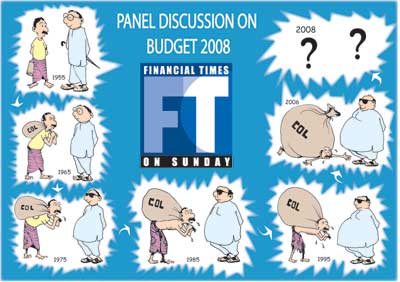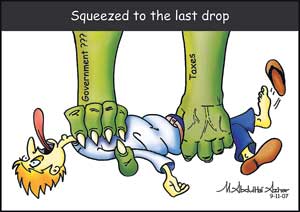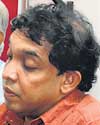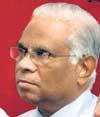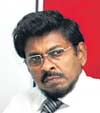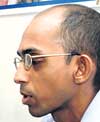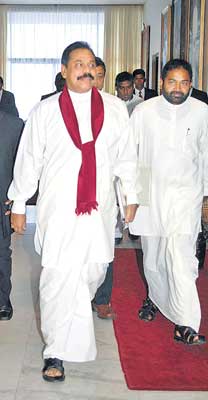
Expanded public sector in budget
Amidst a slew of seminars and discussions which customarily follows the reading of the budget, The Sunday Times FT put together its own panel of experts for an indepth, substantive and enlightening take on Wednesday’s speech by the President to offer our readers fresh insight into the positive and negative aspects of the budget and how it will affect their everyday life. The panel was made up of A.K. Ratnarajah, President of the Ceylon National Chamber of Industries (CNCI), Lalith Kahatapitiya Chairman of KIK Group, Dr Sirimal Abeyratne a senior economist at the University of Colombo and Channa Amaratunga, Director and Chief Investment Officer of Boston Asset Management (Pvt) Ltd. Ratnarajah discussed several positive aspects of the budget for 2008 including the President’s statement about the need for enhancing productivity and avoiding wastages in the government sector. He said no one can be certain as to how far this will be translated into action because this was also spoken of the previous year although nothing has happened. “At least, the realization is there,” he said.
The positive part of the budget from a policy perspective is more focus on encouraging domestic production. Ratnarajah also said he welcomes the proposal to increase milk production in the country. Ratnarajah made mention of the Carbon Fund as something for the country and industry to benefit from. “I’m glad the government saw that opportunity and went for it,” he said. “I also see a certain amount of incentive for the reactivation of the textile sector which is something that is quite necessary.” The apparel sector has been performing well in the economy and is here to stay in the country. “Backward integration is necessary and for that to happen, the development of the textile sector is a must.” Other individual or specific proposals Ratnarajah felt were positive included a thrust for the gem and jewelry sector, a small incentive for the development of Small and Medium Enterprises (SME’s), moving industry out of the western province and into other regions and incentives to relocate. The budget also seeks to reactive the government sector and the cooperative sector which Ratnarajah sees as a negative aspect. In his view, the size of the government is too large. He explained that there are four levels of administration which include the presidential secretariat, the cabinet of ministers and ministries, the provincial council and the local government. “The provincial council was brought in due to the ethnic conflict but it is not working,” he said. With a budget of Rs.60 million, approximately Rs.50 million goes for personal emoluments, all being funded by the government. “Can we really afford all these layers?” he asked. On the negative side, Ratnarajah said the state sector is too large. In Wednesday’s budget speech, there are more government departments to be established and plans to enlarge the Cooperative Wholesale Establishment (CWE) outlets around the country. “The cooperative system is a good thing provided it is operated properly,” Ratnarajah said. “But in Sri Lanka, it is dominated by the politicians and becomes a dictatorship of certain political leaders, leading to corruption and waste. If it isn’t practiced in good form, it doesn’t deliver what it is supposed to deliver.”
According to the budget, tax revenue is increasing by 25% but Ratnarajah said there were no specific proposals for enhancing taxes besides two minor proposals which include the social responsibility levy (SRL) and an increased surcharge on import duty from 10% to 15%. He suggested one way to increase tax revenue was to enlarge the tax base and the government has been able to open up around 80,000 new files. The government also said that revenue should be 17% of the Gross Domestic Product (GDP) but Ratnarajah questioned the feasibility of an increase of 25% in revenue without the GDP also going up by the same rate. From a business perspective, Ratnarajah described this as a ‘status quo maintenance budget.’ “There is no heavy additional burden that has been caused other than the SRL and import duty going up,” he said. “At the same time, I don’t see anything really tangible.” In the past, the business community has voiced concerns about too many taxes and far too much documentation and burdens but nothing has been done so far. In fact, another tax, the environmental levy, has come in. With petrol prices being frozen, Ratnarajah said the cost of living might not go up for the time being. However, cost of living will tend to rise due to taxation on non essential imports which will affect inflation. In fact, Ratnarajah said he does not believe cost of living can be brought down. “The only thing is to enhance the income levels of the people by developing the country. Pruning down the size of the government and pruning down corruption can decrease the cost of living.” Kahatapitiya said he agreed with Ratnarajah’s analysis of the budget but did say he expected the government to take some sort of step towards increasing the incomes of people by generating funds, not simply by giving grants or handouts. “I was looking for some special steps to increase the incomes of people by way of getting more money in the country,” he said. “Inflation is so high and we buy much more than we sell which means we spend much more than we earn.” Kahatapitiya said Sri Lankans are very good at marketing but ‘we’ don’t any see marketing overseas. The atmosphere of manufacturing in Sri Lanka and selling to the world can be induced if political changes are made. “People have to be activated and sent out for marketing,” he said. “There has to be a special initiative which we expected the budget to come out with but there was nothing so we have to keep a dialogue with the government. We have to generate money into the country and curb inflation to help with the deficit.” Kahatapitiya also raised the important issue of whether the country should be sending more people overseas to work or be concentrating on creating an atmosphere where people who are abroad can return and generate wealth for the country, two points which the budget did not touch upon. According to the Central Bank, Kahatapitiya explained that there is a work force of approximately 7 million. The participating rate is around 52% which means the effective work force is 3.5 million who generate close to US$30 billion in GDP for the country. There are approximately 1.5 million workers overseas who send in around US$2 billion to the country. Abeyratne said the government is expecting around 7.5% growth in 2008. “The most important thing to understand with the budget is that the government is an institution which does not have a single cent to spend,” he said. “It just spends other people’s money.” The rising current account deficit remains an issue of vital importance today as it has in the past. “Having a current account deficit means we are borrowing to maintain our day to day life, not just for investment,” he said, adding that there is a rationale if it was for investment only. Recurrent expenditure and capital expenditure make up two sections of the budget. Recurrent expenditure includes wages, interest payments and transfer payments amongst others while capital expenditure is on investment, Abeyratne explained. “Having this deficit means we are borrowing or overspending just to eat, make transfer payments, subsidies and maintain public institutions and this has happened for the past several years.” The largest expenditure item in the current account is the interest payment on past government loans. Even in the current budget, it is still the largest single item which Abeyratne expects will increase over the next five years due to the large foreign loan of US$500 million the government recently procured. “This is the easiest and most dangerous way of borrowing,” he said. It is easy because the loan is not project bound, have no conditions attached to it and does not require feasible project reports to be provided. It is dangerous because it can be spent on anything without any oversight. “If it is spent on infrastructure development as we have been told, there is a rationale for the loan,” Abeyratne said. “I think infrastructure is a long term investment and there are many proper ways of borrowing.” When the time comes to make the payment loan with interest which will increase in the future, Sri Lanka has to be certain of achieving a substantial level of economic growth in the range of 8% to 10% over the next five years. “If we can’t realize that, there is a big danger.” Abeyratne said the increase in public investment is substantial, as was the case the previous year. Regarding public spending and investment, he said Sri Lanka does not have an efficient system in which the government has the capacity to spend on investment. “There are projects and offices running all over the country,” he said, which require substantial funds to pay salaries and provide transport amongst other. However, the actual projects are not completed. Although capital spending has been increased, there should be a fundamental change in the government mechanism to make sure the funds are put to good use. Abeyratne said the tax system has become extremely complicated. “The government, in an ad hoc manner, is going after people and asking them to explain their income and expenditure,” he said. “The proper way is everyone should in the system to everyone pays. The rationale should also be that the public wants and likes to pay taxes because they know where the money is going and what is happening to it.” Abeyratne said even the tax department may not be going after all people like they do with the general public so the system becomes convoluted. Another problem is that 80% of tax revenue is coming from indirect taxes when revenue should be coming from direct taxes. The way the situation is currently impacts the cost of living. The government’s proposal to provide a five year tax holiday for businesses to invest in the eastern province may not work if important issues are not dealt with first. Abeyratne said that as a result of the war, the north and east have lost their investment class, their skills and to a certain extent, their physical capital assets. Amaratunga said there has been a genuine attempt to make growth more inclusive with incentives to relocate businesses. Overall, there has been a sharp increase in capital expenditure but it has to be used effectively. “The proposal to increase excise duty on alcohol and cigarettes are positive and most would perceive them as a crucial evil and goods sources of revenue generation.” However, he cautioned that it might also increase the incentive to create counterfeit products. The proposal to support local producers is good, Amaratunga said. However, local consumers must also be supported. If consumers are forced to pay a higher price on local goods as opposed to a cheaper imported product, it is not in the overall interest of the country. “This is an international economy so if you can import it cheaper, why give a handout to local producers?” Amaratunga said the carbon credit proposal is extremely useful with massive long term potential and is glad the government has picked up on this. There has been a tendency to tax sectors which are doing well. In the past, it has been the banking sector and this time around, it is the telecom sector. License fees are being increased and are expected to generate Rs.1 billion in additional revenue. The mobile phone sector tax has been extended to include CDMA sector as well, all of which will likely be passed onto the customer. Amaratunga cautioned that what the government is doing is penalizing someone for performing well. “What incentive is there to do well in the future?” Amaratunga said he was surprised at the lack of emphasis on the service oriented sector in the budget such as business process outsourcing (BPO), the IT sector, financial services and tourism. He also said the financial services and the capital market did not receive any attention at all. The budget also outlined small increases in taxes which won’t grab the headlines but will add up considerably, Amaratunga said. The overall tax burden on customers and corporates will go up but has been done is a very ‘subtle way.’ He cautioned that the government has to be careful that taxes are not enforced in a regressive manner unless they are properly targeted. “Luxury items should be taxed but not essential items.”
|
|
||
| || Front
Page | News
| Editorial
| Columns
| Sports
| Plus
| Financial
Times | International
| Mirror
| TV
Times | Funday Times || |
| |
Reproduction of articles permitted when used without any alterations to contents and the source. |
© Copyright
2007 | Wijeya
Newspapers Ltd.Colombo. Sri Lanka. All Rights Reserved. |
